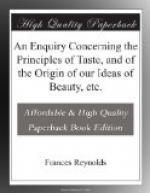The beauty of every part of the human body, forming a perfect whole, is analogous to an instrument of music in perfect concord, and mere exactitude of proportion in its parts, exclusive of the idea of mind, would, I imagine, have no more effect upon the spectator than the mere concord of the strings of an instrument has on the hearer; it amounts to no more than blameless right, nor, till influenced by sentiment, can it go farther.
But, as we are incapable of separating the idea of the human form from the human mind, and as the touch of an instrument in perfect concord gives a presentiment of harmony, so does the perception of the concordance of the parts of a beautiful form give a perception of grace. The mind, as I have observed before, cannot rest in fixed perfection, the Spotless white; and its natural transition from beauty must be into the region of grace.
Section 3. Grace.
The principles, which constitute grace, genius, or taste, are one; which is denominated grace in the object, genius in the production of the object, and taste in the perception of it.
The existence of grace seems to depend more upon the character of mental than of corporeal beauty. All its motions seem to indicate and, to be regulated by the utmost delicacy of sentiment! I have placed it between the highest sentiment of the human mind, sublmity, that no rules can teach, and the highest sentiment that rules can teach, exact beauty, the two extremes of the vrai reel and the vrai ideal. Grace seems, as it were, to hang between the influence of both; the irregular sublime giving character and relief to the negative and determined qualities of beauty; and beauty, i.e. truth, confining within due bounds the eccentric qualities of sublimity, forming, both to sight and in idea, orderly variety, the waving line, neither straight nor crooked. The waving line is the symbol, or memento, as I may say, of grace, wherever it is seen in whatever form, animate or inanimate; and may be justly styled the line of taste or grace!
The perception of grace seems not to be intirely new nor intirely familiar to us; but is, as it were, what we have had a presentiment of in the mind, without examining it, and which the graceful object, or action, &c. calls forth to our view. Being so much our own idea, we like to behold it, to dwell upon it; and yet, not being a familiar idea, it creates a pleasing mild degree of admiration.
Grace seems half celestial; for all the virtues accompany, indeed compose, the perception; for none, I imagine, can have a perception of grace that has none of the charms of virtue.
The sentiment of grace, caused by the motion of beauty, music, poetry, beneficence, compassion, &c. may be ranked as the highest intellectual pleasure the mind is capable of perceiving, and brings with it a sort of undetermined consciousness of the delicacy of our own perceptions in making the discovery, a degree of that glorying that Longinus observes always accompanies the perception of the sublime.




